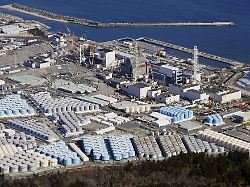Because of plans for nuclear power plant wastewater
China wants to ban food imports from Japan
07/07/2023, 10:25 am
Japan is allowed to discharge radioactive cooling water from the damaged Fukushima nuclear power plant into the sea. For security reasons, China now wants to ban food imports from parts of the country. South Korea sees things much more calmly.
China wants to ban food imports from parts of Japan as a result of the planned discharge of treated cooling water from the damaged Japanese nuclear power plant Fukushima into the sea. According to the Chinese customs authority, the import of food from ten Japanese prefectures is to be banned for security reasons, including Fukushima. Strict radiation tests are planned for food from the rest of Japan.
Japan wants to discharge treated cooling water from the Fukushima nuclear power plant into the sea. The International Atomic Energy Agency finally approved the Japanese project on Tuesday. The initiation is set to begin in the summer but is controversial at home and abroad. In addition to fishermen from Fukushima, who fear worse business, Beijing also criticized the plan. The Chinese Foreign Ministry on Thursday warned of unknown risks to human health. In South Korea, the announcement from Tokyo led to panic buying of salt and a hunger strike by several opposition MPs.
Only “minor” impact on South Korea
The Seoul government said the water discharge would have “minor” impacts on South Korea. A separate study of Tokyo’s plans has concluded that Japan will meet or exceed key international standards, said Minister of Policy Coordination Bang Moon Kyu. He said it would take up to 10 years for the water discharged into the Pacific Ocean to get anywhere near the Korean Peninsula.
The Fukushima Daiichi nuclear power plant was hit by a 15 meter high tsunami in 2011 after a severe earthquake. The power plant’s cooling system failed, and core meltdowns occurred in three of the six reactors. The complete decommissioning of the plant will take decades. It was the worst nuclear accident in the world since the Chernobyl nuclear power plant in Ukraine in 1986.
One of the most urgent problems facing nuclear power plant operator Tepco is how to deal with the approximately 1.3 million cubic meters of water that have accumulated in the plant. This is a mixture of groundwater, rainwater and cooling water. According to Tepco, before this is to be discharged into the sea, almost all radioactive components are filtered out – except for tritium, which is to be diluted at the end.
